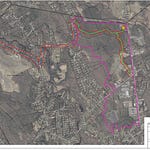SOUTH SHORE, MA – A fierce and ongoing battle is unfolding across the South Shore as numerous towns continue to resist the state-mandated MBTA Communities Act, a law designed to spur multi-family housing development near public transit. Despite a ruling by the state's highest court upholding the law's constitutionality, local municipalities are fighting back, primarily citing concerns over the financial burden of an "unfunded mandate" and a desire to preserve local control.
The MBTA Communities Act, signed into law in 2021 by former Governor Charlie Baker, requires 177 cities and towns across Massachusetts with or near MBTA services to zone for at least one district where multi-family housing is permitted as of right. The law's proponents, including current Governor Maura Healey and Attorney General Andrea Campbell, emphasize its necessity in addressing the state's severe housing crisis. However, many South Shore communities view it as an overreach, arguing it infringes on their ability to manage local development.
The "Unfunded Mandate" at the Heart of the Fight
A central pillar of the towns' opposition is the claim that the MBTA Communities Act is an "unfunded mandate". This argument gained significant traction after Massachusetts Auditor Diana DiZoglio's office, specifically the Division of Local Mandates (DLM), concluded that the law indeed constitutes an unfunded mandate because sufficient funding was not provided when the law was passed. Wrentham, Methuen, and Middleborough were among the towns that initially prompted DiZoglio's office to review this question.
Towns like Marshfield, Middleborough, and Hanson have filed lawsuits in Plymouth Superior Court, citing this unfunded mandate conclusion. Their complaints argue that the law would force them to incur substantial infrastructure costs to accommodate new housing, impacting water systems, public safety services, educational services, buildings, roads, and other governmental services. Marshfield specifically stated that the unfunded mandate conclusion "enables" the town to seek "an exemption from compliance until the Commonwealth of Massachusetts provides sufficient funding". Marshfield's former Town Administrator, Michael Maresco, highlighted the town's obligation to take legal measures to protect residents' rights and preserve grant funding.
However, the state's position, as articulated by Attorney General Andrea Campbell and Governor Maura Healey, is that the DLM's opinion holds no legal weight. They contend that the law is not an unfunded mandate and that the state has provided nearly $8 million in funding to assist communities with zoning changes, along with creating a fund to support new construction and infrastructure improvements in compliant communities. Campbell has expressed regret that the Auditor's "incorrect legal assessment has spurred challenges" to a law aimed at the housing crisis.
In a significant development on June 6, 2025, a Massachusetts Superior Court judge dismissed lawsuits from nine towns, including Duxbury, Hanson, and Marshfield, challenging the MBTA Communities Law. Judge Mark C. Gildea ruled that the law does not impose an unfunded mandate, finding that any potential future infrastructure costs were "indirect and speculative" rather than direct costs that would trigger the unfunded mandate law. The court also noted that the law "merely encourages" housing production through zoning, it does not compel construction.
Protecting Local Character and Autonomy
Beyond the financial argument, many South Shore towns are deeply concerned about the loss of local control over zoning decisions and the potential impact on their community's character.
• In Marshfield, residents voted against adopting new zoning bylaws to comply with the Act twice at special town meetings, with town officials like Town Planner Greg Guimond and former Select Board Chair Lynne Fidler warning about the risks of non-compliance. Despite the warnings, residents voiced strong opposition, stating they had said "no the first time around and the state and the town should take no for an answer". Marshfield also argued the law infringes on its Town Meeting authority, though the court dismissed this, citing the Legislature's supreme authority over towns.
• Halifax residents overwhelmingly rejected a proposed overlay district in December 2024, with selectmen expressing serious concerns about the state mandate. Selectman Jonathan Selig declared his duty was to the "will of the people of Halifax, not the state of Massachusetts". The town has since filed a complaint in superior court seeking an injunction to prevent the state from taking action related to the zoning and passed a proclamation urging the Legislature to amend or repeal the Act to restore local control.
• East Bridgewater voters also rejected a proposed MBTA Communities overlay district in May 2025, with residents expressing concerns about increased traffic and preserving the town's "small rural town" character.
Consequences of Non-Compliance
The stakes for non-compliant towns are high. Towns that fail to comply with the law become ineligible for funds from several state grant programs, including the Housing Choice Initiative, Local Capital Projects Fund, MassWorks Infrastructure Program, and HousingWorks Infrastructure Program. The Healey-Driscoll Administration has also indicated that compliance will be considered when dispensing certain discretionary local aid.
• Marshfield has already received notification that its application for a $261,600 dredging project grant was contingent on compliance, and former Town Administrator Maresco confirmed they are tracking other grants being denied.
• Halifax successfully secured a $125,000 grant for a school regionalization study but had to transfer it to Kingston due to potential non-compliance with the MBTA Communities Law.
• In Hanson, voters rejected a $275,000 appropriation for legal fees to defend against potential lawsuits related to non-compliance. Hanson Town Administrator Lisa Green confirmed the town would be in compliance until July 13, after which the Attorney General could take action.
As of July 31, 2025, East Bridgewater, Halifax, Hanover, Hanson, and Marshfield are listed among the 15 non-compliant communities, having missed their extended July 14, 2025 deadlines to submit district compliance applications.
Looking Ahead
Despite the recent court dismissals of lawsuits challenging the unfunded mandate argument, the tension between state mandates and local autonomy persists. While the Supreme Judicial Court has affirmed the Attorney General's power to enforce the law, it also previously ruled that the state's initial guidelines were "unenforceable" due to procedural errors, requiring new emergency regulations that were subsequently issued.
Some Republican lawmakers are pushing for amendments to the law, including extending the mandate to all Massachusetts towns, excluding public safety grants from being withheld, or extending compliance deadlines further. Representative Ken Sweezey, whose district includes Halifax, Marshfield, and Hanson, recently spoke at a public hearing on over two dozen bills related to the MBTA Communities Act, advocating for revisions or even an appeal of the law.
The ongoing legal battles and local resistance highlight the deep divisions over how to address the housing crisis while respecting local decision-making and fiscal realities. As towns navigate these challenges, the ultimate impact on South Shore communities and the state's housing goals remains to be seen.
Sources for this article include: South Shore News, Boston.com, WATD, State House News Service, Commonwealth Beacon, and WBUR.











